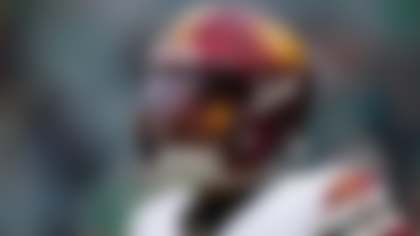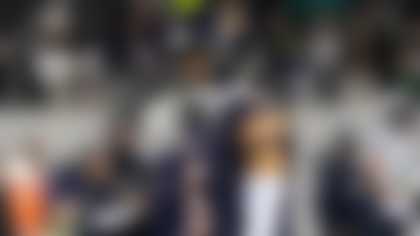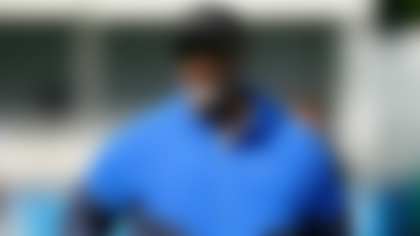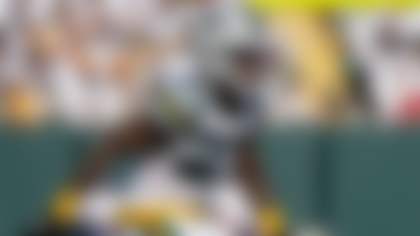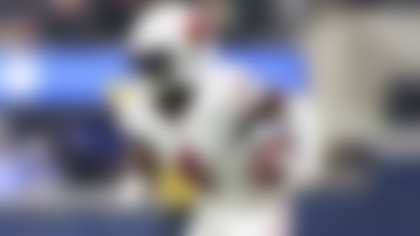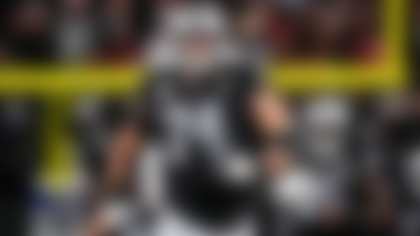As the regular season enters its final month, NFL leaders are already looking ahead to how they might adjust the game in the years to come.
Two items atop the list: eliminating hip-drop tackles and changing kickoffs for the better.
NFL Commissioner Roger Goodell told reporters on Wednesday at the conclusion of the December League Meeting in Irving, Texas, that he would prefer to see the hip-drop tackle eliminated.
"Hip drop, I would tell you, I think we all should work to get that out of the game," Goodell said. "You see it escalated in the number of times it occurred this season. The injury can be very devastating. We saw that also. It's not just happening at the NFL level. It's also happening at other levels. (It's) something I feel like we've got to work very hard to get that removed this spring."
NFL executive vice president of football operations Troy Vincent echoed Goodell's stance when addressing the media earlier Wednesday.
"I think we have to now," Vincent said of removing the hip-drop tackle.
"I think a year ago when we actually brought the hip-drop or the version of the tackle that we were seeing on the video, there were some clips that we had no clue what we were talking about. In their mind, never saw it before, don't teach it. Others were not actually teaching a version of it with the intent of injuring a player, but versions of the tackle. All of this is in that family of when we saw the hawk tackle and people adjusting to getting the head out of the game.
"One thing that we can do today is define what that is. It is the grip, it's the rotate and it's the drop. Those three mechanics show up on that play."
The hip-drop tackle has become a topic of conversation as of late due to injuries caused by the style of takedown. On Monday night, Miami Dolphins superstar receiver Tyreek Hill suffered an ankle injury when he was tackled in a hip-drop style, missing nearly two full quarters of action before deciding to play through the pain in the second half of Miami's eventual loss to the Tennessee Titans. In the college ranks, Florida State quarterback Jordan Travis suffered a broken leg as a result of a hip-drop tackle, ending his season and eventually leading to a controversial snub of the Seminoles by the College Football Playoff selection committee.
The NFL has already gone out of its way to eliminate other forms of contact in the best interest of player safety. Horse-collar tackles were outlawed after receiver Terrell Owens suffered a broken ankle when he was brought down by the rear collar of his shoulder pads late in the 2004 season, and the NFL has made a continued effort to take the head out of the game, penalizing players for initiating contact with their helmet.
The hip-drop tackle could be next.
"It's a gruesome play," Vincent told reporters on Wednesday. "We've seen high-profile -- every player counts -- but you just mentioned the Tyreek Hill (play). That was a combination of a little bit of when you saw it, that was some of the video we showed today, when you watch video you can see the mechanics, which the membership had an opportunity today to see what we're looking for to get out.
"And they also saw clear examples of good plays that are similar. Where there are good tackles. Because we're not trying to remove a hustle. You're not trying to remove a player running someone down from behind and tackling from behind. What we are trying to remove is the grip, rotate and dropping on the back of those heels."
The kickoff play will also be discussed this offseason. As will a possible rule change for fumbles that travel out of bounds through the end zone (which currently result in a change of possession and touchback), and the NFL's response to a play that has exploded in popularity, a version of a quarterback sneak known as the "tush push."
Vincent referred to kickoffs on Wednesday as "a dead ceremonial play today" following rule changes to increase the safety of kickoffs.
"I think kickoff stats, they speak for themselves," Vincent said. "This is one where we spent a lot of time from February last year meeting with the coaches -- give us an alternative, like give us other solutions. But the injury rate was so significant when we go back to 2018, 2019 when we removed the trap block, the wedge block, the cross block, attack block and made tremendous progress in getting those plays that nobody wanted in the game anymore out.
"We went back to those numbers again last year, from a head impact standpoint, which I think is all of our responsibilities as gatekeepers not to see that trend go back to where it was. We understand that there is space and speed issues that come along with the kickoff. This is why we were asking the coaches what we can do. But what we can't do is stay where we are. So we're hoping they come back with some alternatives."
Goodell told reporters that the league wants to see increased kickoff attempts while also maintaining player safety.
"We believe the foot is part of the game and kickoff returns are an exciting play," Goodell said on Wednesday. "We see it at 20 percent this year. We'd like to see that higher. But we also want to make sure that the injury rate is addressed, and so we're going to have to innovate. We're going to have to be smart. We're going to have to do what we've done before, which is make the game more exciting and make it safer at the same time. We've proven we can do that and we're going to do it."
The Eagles' take on the traditional quarterback sneak has led to a widespread implementation of what amounts to a rugby scrum in short-yardage situations, in which linemen attempt to win the leverage battle up front, while multiple teammates push a quarterback forward from behind. Philadelphia executes it at an incredible rate of success, while the rest of the league is attempting to match their productivity by mimicking it in their own contests.
Some fans love the play. Others hope it is soon outlawed, on the basis of it being deemed unfair.
Vincent took a different stance on the matter: Be better.
"I think there was a report that either the league office or the Commissioner was looking to eliminate this play. That was false," Vincent said. "We've been monitoring this play from Week 1 of the regular season. This play has evolved. It has evolved, which coaches told us it would. We're seeing passes come out of that formation. People doing things differently than what we've seen a year ago. Everyone doesn't have the Philly success rate, but people are trying it.
"I would just say, Philly does it better than everyone else. That's a fact. On those fourth-and-1, fourth-and-inches situations, we've seen others -- I think I've reviewed 78 plays on Friday of just the push play itself -- just looking at formation. Is it one-back, two backs pushing, three backs? They're very effective.
"And that's what we don't want to do. So talking to the membership, you don't want to punish anyone for doing something well. People have tried different things to stop it. Have not had success. That's why bringing it to the membership just to say this play has evolved. Other people are doing it, and we've seen some pretty good football from the evolution of the original formation."
Goodell told reporters on Wednesday that he has not "taken a position" on the tush push.
"I want to hear how people feel about it," Goodell said. "A lot of it's 'I like' or 'don't like,' I think we want to look at, is there enough data to talk about the safety of it? Are there other aspects that we need to think about? A lot of coaches talked last year about innovation would come off of that play. I'd like to take a look back at that. Has that really occurred? Listen, I think in anything it's important to hear the different perspectives. Let the committee do their work. I'll be able to participate in that, and I'm sure we'll have a position by March."
At both professional and collegiate levels, teams are using the as a fake and running plays on the perimeter, or throwing passes for successful outcomes. Based on Vincent's comments, the NFL encourages this type of creativity, and certainly isn't interested in stifling it.
As for another disputed ruling -- fumbles through the end zone resulting in touchbacks -- it's not a frequent occurrence, but can serve as a bit of a lightning rod for discourse when it does happen. Vincent admitted the current rule "may be too punitive," opening the door for potential changes.
"It doesn't happen very often," Vincent said. "But it's a significant – as many would say on the football side, he should've held the ball in the right hand, that's his fault. And then others would say give him a chance again, maybe do something else. So that may be something that we should be taking a look at."



